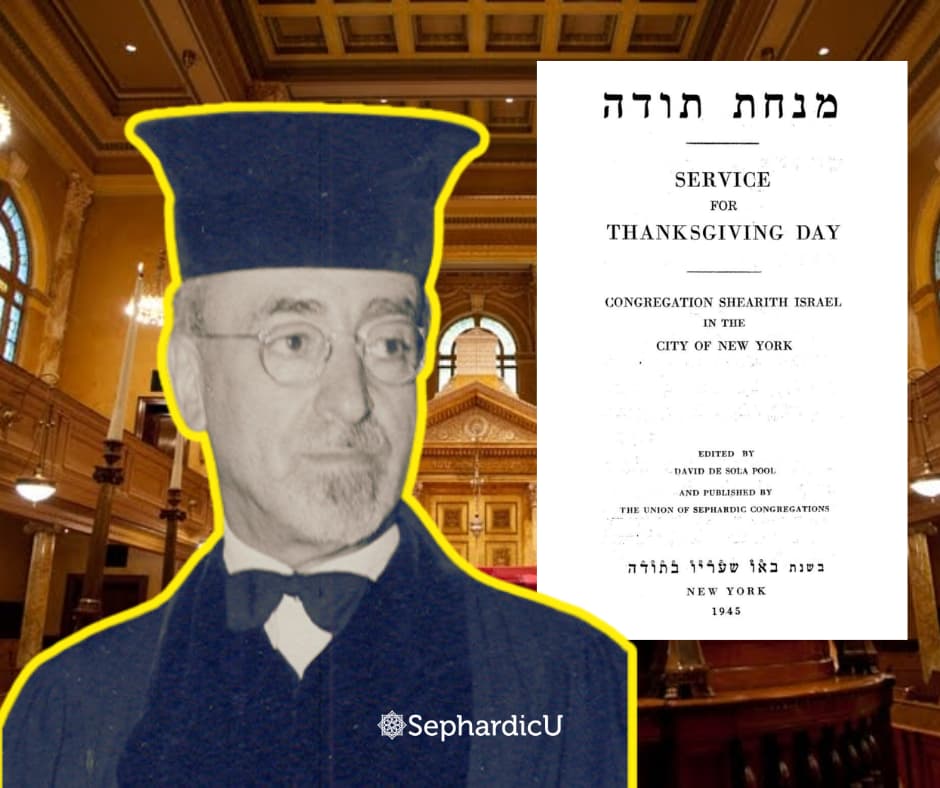Thanksgiving is a time for gratitude, family, and tradition. For Congregation Shearith Israel, the oldest Jewish congregation in America, Thanksgiving carries unique significance. In this heartfelt letter, Rabbi Daniel Bouskila, International Director of the Sephardic Educational Center, reflects on the history and meaning of Sephardic Thanksgiving prayers.
Founded in 1654 by 23 Spanish & Portuguese Jews, Congregation Shearith Israel holds a special place in American Jewish history. Having endured the Spanish Inquisition and the expulsion from Spain in 1492, these Jews found freedom and refuge in America. Their gratitude for this freedom was expressed through an official Thanksgiving service, which continues to be observed to this day.
Below is Rabbi Bouskila’s letter, offering a rich historical perspective on the significance of Sephardic Thanksgiving prayers and their enduring relevance:
Sephardic Thanksgiving Prayers by Rabbi Daniel Bouskila
For most Americans, Thanksgiving morning is often associated with watching the Macy’s Thanksgiving Day Parade and football games, all while preparing the festive meal. But for the members of the historic Congregation Shearith Israel (the Spanish & Portuguese Sephardic Congregation in Manhattan), an additional feature of Thanksgiving morning is, appropriately, a religious service expressing gratitude for the blessing of living in America.
Founded in 1654 by 23 Spanish & Portuguese Jews, Shearith Israel is the first and oldest Jewish congregation in America. Having lived through and proudly participated in America’s War of Independence, Shearith Israel’s members took heed of George Washington’s official declaration of Thanksgiving as a national holiday, when he proclaimed November 26, 1789, “a day of public Thanksgiving and prayer.”
As descendants of Sephardic Jews who were persecuted during the Spanish Inquisition and ultimately expelled from Spain in 1492, the members of Shearith Israel were deeply grateful to live in the United States, where they were granted full citizenship and freedom of worship, free from government persecution for being Jewish. The idea of an American “day of public Thanksgiving and prayer” resonated profoundly with them.
They established an official Thanksgiving service, held mid-morning in the synagogue’s sanctuary. Observed to this very day at Shearith Israel in New York, the service features the chanting of several Biblical Psalms of thanks, a prayer for the United States government, and a sermon by the rabbi expressing gratitude for the blessing of living in America. The service was composed and adjusted over time by the congregation’s various rabbis, and it was finalized by Rabbi David De Sola Pool.
Rabbi De Sola Pool’s version was printed in 1945 as Minhat Todah – Service for Thanksgiving Day. It is no coincidence that the service was printed as an official prayer booklet in 1945—the first post-World War II Thanksgiving. A prayer book formalizes the status of a prayer service, and I imagine that after the Holocaust, Rabbi De Sola Pool and the congregation felt an even deeper sense of gratitude for having lived in America, rather than in Europe, during World War II.
Like the founding members of Shearith Israel, I am a descendant of Sephardic Jews whose ancestors were persecuted and expelled from Spain. I am also a proud first-generation American, the child of immigrants.
The great Sephardic poet Judah Halevy famously wrote, “My heart is in the East,” expressing his longing for the Land of Israel. I have fulfilled Judah Halevy’s longing for “the East,” and I am now privileged to live in Israel. Yet, I will always be proud to be an American Jew.
On Thanksgiving Day, here in Israel, I will proudly recite the prayers in Minhat Todah, expressing my continued gratitude for the blessing of being an American, and for the blessing that is America.
Happy Thanksgiving and Shabbat Shalom.
[November 28, 2024]
Minhat Todah: Service for Thanksgiving Day
One of the most notable elements of Shearith Israel’s Thanksgiving tradition is the Minhat Todah, a prayer book composed by Rabbi and Dr. David De Sola Pool and finalized in 1945. Rabbi De Sola Pool was a distinguished scholar, rabbi, and community leader who played a vital role in shaping the congregation’s spiritual life. His prayer book formalized the Thanksgiving service, which includes the chanting of Biblical Psalms, prayers for the United States government, and a sermon emphasizing gratitude.
Rabbi Bouskila highlights how this prayer book gained even deeper meaning in the post-Holocaust era, underscoring the unique blessings of living in America. Rabbi De Sola Pool’s contributions continue to serve as a testament to the deep connection between Jewish faith and the American ideals of freedom and thanksgiving.
We are pleased to share this historical prayer book with you. Please feel free to explore its pages and reflect on the enduring values it represents.
Conclusion
Rabbi Bouskila’s letter beautifully illustrates the enduring significance of Sephardic Thanksgiving prayers. It reminds us of the profound gratitude that Sephardic Jews felt—and continue to feel—for the freedom and opportunities offered by America. Whether in the United States or Israel, these prayers reflect the timeless values of faith, resilience, and thanksgiving.







